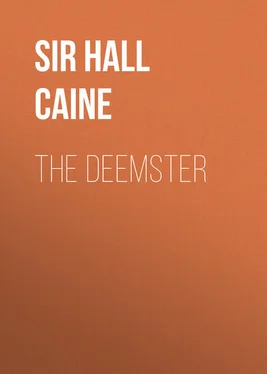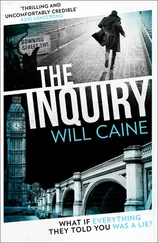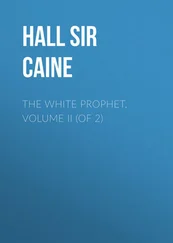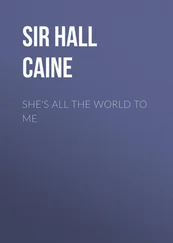Hall Caine - The Deemster
Здесь есть возможность читать онлайн «Hall Caine - The Deemster» — ознакомительный отрывок электронной книги совершенно бесплатно, а после прочтения отрывка купить полную версию. В некоторых случаях можно слушать аудио, скачать через торрент в формате fb2 и присутствует краткое содержание. ISBN: , Жанр: foreign_antique, foreign_prose, на английском языке. Описание произведения, (предисловие) а так же отзывы посетителей доступны на портале библиотеки ЛибКат.
- Название:The Deemster
- Автор:
- Жанр:
- Год:неизвестен
- ISBN:http://www.gutenberg.org/ebooks/35781
- Рейтинг книги:5 / 5. Голосов: 1
-
Избранное:Добавить в избранное
- Отзывы:
-
Ваша оценка:
- 100
- 1
- 2
- 3
- 4
- 5
The Deemster: краткое содержание, описание и аннотация
Предлагаем к чтению аннотацию, описание, краткое содержание или предисловие (зависит от того, что написал сам автор книги «The Deemster»). Если вы не нашли необходимую информацию о книге — напишите в комментариях, мы постараемся отыскать её.
The Deemster — читать онлайн ознакомительный отрывок
Ниже представлен текст книги, разбитый по страницам. Система сохранения места последней прочитанной страницы, позволяет с удобством читать онлайн бесплатно книгу «The Deemster», без необходимости каждый раз заново искать на чём Вы остановились. Поставьте закладку, и сможете в любой момент перейти на страницу, на которой закончили чтение.
Интервал:
Закладка:
If half the inhabitants of the island turned out at old Ewan's funeral, the entire population of four parishes made a holiday of his son's wedding. The one followed hard upon the other, and thrift was not absent from either. Thorkell was married in the early spring at the Archdeacon's church, at Andreas.
It would be rash to say that the presence of the great company at the wedding was intended as a tribute to the many virtues of Thorkell Mylrea. Indeed, it was as well that the elderly bridegroom could not overhear the conversation with which some of the homely folk beguiled the way.
"Aw, the murther of it," said one buirdly Manxman, "five-and-forty if he's a day, and a wizened old polecat anyway."
"You'd really think the gel's got no feelin's. Aw, shockin', shockin', extraordinary!"
"And a rael good gel too, they're sayin'. Amazin'! Amazin'!"
The marriage of Thorkell was a curious ceremony. First there walked abreast the fiddler and the piper, playing vigorously the "Black and Gray"; then came the bridegroom's men carrying osiers, as emblems of their superiority over the bridesmaids, who followed them. Three times the company passed round the church before entering it, and then they trooped up toward the communion-rail.
Thorkell went through the ceremony with the air of a whipped terrier. On the outside he was gay in frills and cuffs, and his thin hair was brushed crosswise over the bald patch on his crown. He wore buckled shoes and blue laces to his breeches. But his brave exterior lent him small support as he took the ungloved hand of his girlish bride. He gave his responses in a voice that first faltered, and then sent out a quick, harsh, loud pipe. No such gaunt and grim shadow of a joyful bridegroom ever before knelt beside a beautiful bride, and while the Archdeacon married the spectre of a happy man to his own submissive daughter, the whispered comments of the throng that filled nave and aisles and gallery sometimes reached his own ears.
"You wouldn't think it, now, that the craythur's sold his own gel, and him preaching there about the covenant and Isaac and Rebecca, and all that!"
"Hush, man, it's Laban and Jacob he's meaning."
When the ceremony had come to an end, and the bridegroom's eyes were no longer fixed in a stony stare on the words of the Commandments printed in black and white under the chancel window, the scene underwent a swift change. In one minute Thorkell was like another man. All his abject bearing fell away. When the party was clear of the churchyard four of the groom's men started for the Rectory at a race, and the first to reach it won a flask of brandy, with which he returned at high speed to the wedding company. Then Thorkell, as the custom was, bade his friends to form a circle where they stood in the road, while he drank of the brandy and handed the flask to his wife.
"Custom must be indulged with custom," said he, "or custom will weep."
After that the company moved on until they reached the door of the Archdeacon's house, where the bride cake was broken over the bride's hand, and then thrown to be scrambled for by the noisy throng that blew neat's horns and fired guns and sang ditties by the way.
Thorkell, with the chivalrous bearing of an old courtier, delivered up his wife to the flock of ladies who were ready to pounce upon her at the door of the Rectory. Then he mingled freely with the people, and chattered and bantered, and made quips and quibbles. Finally, he invited all and sundry to partake freely of the oaten cake and ale that he had himself brought from Ballamona in his car for the refreshment of his own tenants there present. The fare was Lenten fare for a wedding day, and some of the straggle-headed troop grumbled, and some sniffled, and some scratched their heads, and some laughed outright. The beer and bread were left almost untouched.
Thorkell was blind to the discontent of his guests, but the Archdeacon perceived it, and forthwith called such of the tumultuous assemblage as came from a distance into his barns. There the creels were turned bottom up, and four close-jointed gates lifted off their hinges were laid on the top for tables. Then from pans and boilers that simmered in the kitchen a great feast was spread. First came the broth, well loaded with barley and cabbage, and not destitute of the flavor of numerous sheep's heads. This was served in wooden piggins, shells being used as spoons. Then suet pudding, as round as a well-fed salmon, and as long as a 30 lb. cod. Last of all a fat hog, roasted whole, and cut with a cleaver, but further dissected only by teeth and fingers, for the unfastidious Manxman cared nothing for knife and fork.
After that there were liquor and lusty song. And all the time there could be heard, over the boisterous harmony of the feasters within the barn, the yet noisier racket of the people without.
By this time, whatever sentiment of doubtful charity had been harbored in the icy breast of the Manxman had been thawed away under the charitable effects of good cheer, and Thorkell Mylrea and Archdeacon Teare began to appear in truly Christian character.
"It's none so ould he is yet, at all at all."
"Ould? He hasn't the hayseed out of his hair, boy."
"And a shocking powerful head-piece at him for all."
There were rough jokes and dubious toasts, and Thorkell enjoyed them all. There was dancing, too, and fiddling, and the pipes at intervals, and all went merry until midnight, when the unharmonious harmonies of fiddle and pipes and unsteady song went off over the Curraghs in various directions.
Next morning Thorkell took his wife home to Ballamona. They drove in the open springless car in which he had brought down the oaten cake and ale. Thorkell had seen that the remains of these good viands were thriftily gathered up. He took them back home with him, carefully packed under the board on which his young wife sat.
CHAPTER II
A MAN CHILD IS BORN
Three years passed and Thorkell's fortunes grew apace. He toiled early and late. Time had no odd days or holiday in his calendar. Every day was working day except Sunday, and then Thorkell, like a devout Christian, went to church. Thorkell believed that he was a devoutly religious man, but rumor whispered that he was better able to make his words fly up than to prevent his thoughts from remaining below.
His wife did not seem to be a happy woman. During the three years of her married life she had not borne her husband children. It began to dawn upon her that Thorkell's sole desire in marriage had been a child, a son, to whom he could leave what no man can carry away.
One Sunday morning, as Thorkell and his wife were on their way to church, a young woman of about twenty passed them, and as she went by she curtsied low to the lady. The girl had a comely, nut-brown face, with dark wavy clusters of hair tumbling over her forehead from beneath a white sun-bonnet, of which the poke had been dexterously rolled back. It was summer, and her light blue bodice was open and showed a white under-bodice and a full neck. Her sleeves were rolled up over the elbows, and her dimpled arms were bare and brown. There was a look of coquetry in her hazel eyes as they shot up their dark lustre under her long lashes, and then dropped as quickly to her feet. She wore buckle shoes with the open clock tops.
Thorkell's quick eyes glanced over her, and when the girl curtsied to his wife he fell back the few paces that he was in front of her.
"Who is she?" he asked.
Thorkell's wife replied that the girl was a net-maker from near Peeltown.
"What's her name?"
Thorkell's wife answered that the girl's name was Mally Kerruish.
"Who are her people? Has she any?"
Thorkell's wife explained that the girl had a mother only, who was poor and worked in the fields, and had come to Ballamona for help during the last hard winter.
Читать дальшеИнтервал:
Закладка:
Похожие книги на «The Deemster»
Представляем Вашему вниманию похожие книги на «The Deemster» списком для выбора. Мы отобрали схожую по названию и смыслу литературу в надежде предоставить читателям больше вариантов отыскать новые, интересные, ещё непрочитанные произведения.
Обсуждение, отзывы о книге «The Deemster» и просто собственные мнения читателей. Оставьте ваши комментарии, напишите, что Вы думаете о произведении, его смысле или главных героях. Укажите что конкретно понравилось, а что нет, и почему Вы так считаете.












